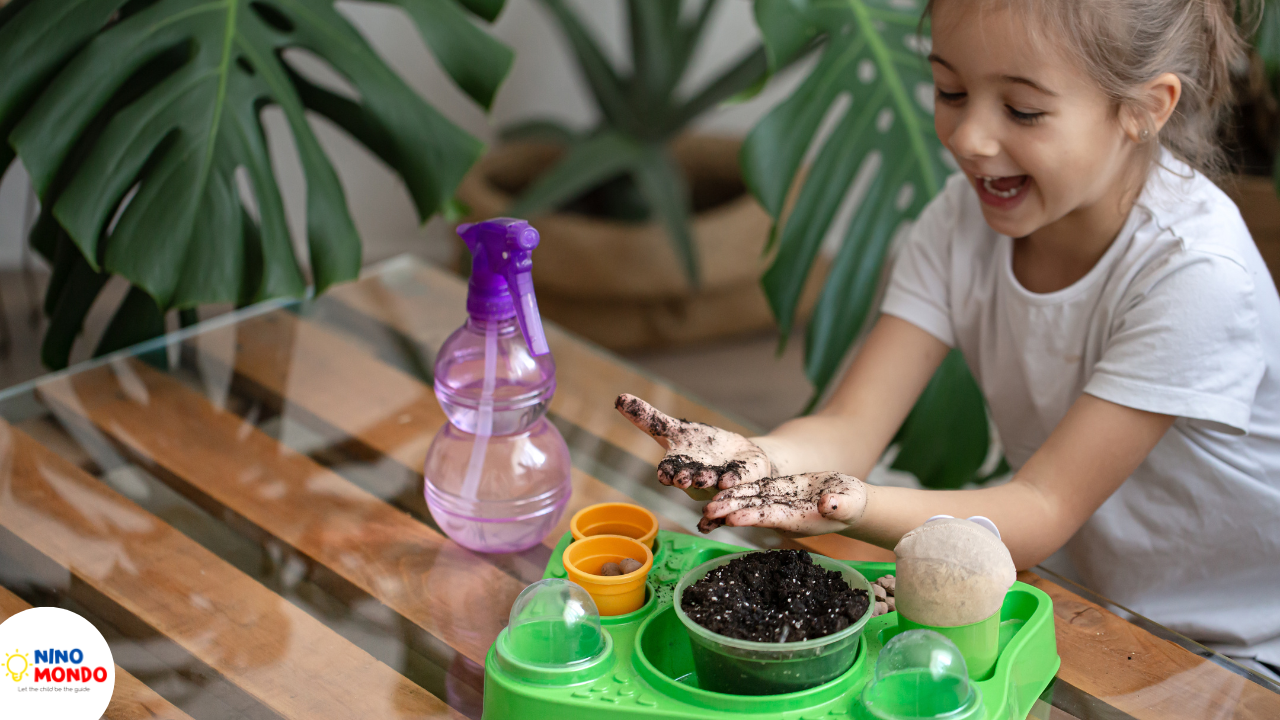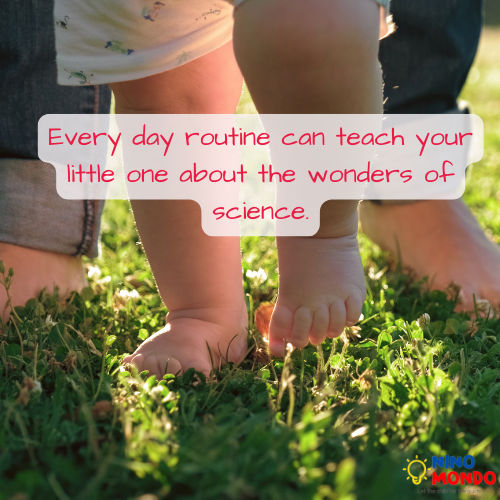Nature & Science in Tiny Hands: Montessori Guide for Parents
Nov 20, 2023
With Montessori education, even simple moments—sunlight, rain, or leaves—can become an opportunity for learning for your little one.
As parents, each little coo, each tiny grasp, and each curious stare of your little one should be an invitation for you to explore the world together. At this age, children are natural scientists: they absorb textures, observe motions, sense sounds, and smell fragrances. And Montessori gives us a beautiful way to nurture that curiosity, gently and lovingly, rooted in everyday life.
Here’s how you can use the Montessori approach to help your baby or toddler begin their journey of discovery (with tips designed especially for Indian parents to practice at home).
Why early exposure to nature & scientific thinking matters?
From birth, babies are taking everything in and are ever so curious to explore their surroundings and everything they come in contact with. A breeze, a bird’s call, the feel of grass on their tiny feet—all of this builds the foundations for thinking, observing, and learning.
When you let your child explore (in safe ways), you are helping them develop attention, curiosity, confidence, and the joy of discovery. Montessori encourages and allows parents, especially those of young children, to find this path towards learning and growth for their child through the application of scientific concepts. And in this manner, parents can not only create a safe foundation for science in their children, but also develop their empathy towards nature and its gifts.
Montessori education will help your little one explore nature’s wonders with joy, safety, and curiosity.
To be honest, in India, we are blessed with so many seasons, colours, nature’s rhythms (monsoon, winter chill, spring bloom, summer sun), and more. These natural changes are perfect opportunities to help your child understand the world physically as well as emotionally.

What does Montessori teach us about letting science be part of daily life?
Well, Montessori is the perfect medium for your child to help them understand the works of nature and incorporate these learnings as an opportunity for developing an interest in science.
These are some of the simplest (yet most effective) ways Montessori education helps make science a part of your child’s daily life:
1. Hands‐on experience
Yes, even in the earliest months, your baby is learning through touch, taste, and hearing. Montessori education becomes helpful in understanding how these methods work and can be best utilised to support your child’s milestone developments. Montessori encourages the provision of simple, safe materials, such as smooth pebbles, wooden objects, soft fabrics, natural leaves, or flowers. Use these materials and let them touch, feel, bring objects to their mouths (supervised), watch how light falls, see shadows, or listen to the rustling of leaves.
2. Observing the outdoors
A balcony, yard, garden, or park can easily become a microscope of nature. Show them ants crawling, butterflies fluttering, clouds passing overhead, or practically anything that is happening around in nature. Talk about the smell after rain, the warmth of the sun, or the cool breeze, and discuss how these feel to the different senses. These are their first “science” lessons, and you do not even need a textbook for these experiences.
3. Every day routines as discovery zones
Cooking? Washing? Pouring water? You can use every routine work you do to teach your little one about the wonders of science. Even when you are feeding them, it can become an exploration moment with the concepts of shapes, colours, and textures involved. As you scoop rice or dal, your baby watches, feels, maybe even helps with finger foods. These small actions are a great way to help them understand cause and effect, motion, and balance.
4. Encouraging curiosity, not insisting on correctness
If your child touches soil and rubs it, don’t rush them to clean themselves; let them experience (within limits). If they ask “Why?”, instead of correcting them, try responding, “Let’s see together.” Answering in ways that invite more observation (“What does it smell like?”, “Is it soft or rough?”) will build their desire to learn more and understand
Montessori education reminds us that your little ones don’t need fancy toys—nature itself is the richest classroom.
Check me out: Montessori Mindful Parenting - First Year Course (0-12m)
What parents can do: Simple Montessori ideas for 0-24 months
Here are easy, warm ideas you can try at home or when out, even in the small spaces of Indian homes or apartments.
|
Age |
Ideas to explore nature & science |
|
0-6 months |
Sensory baskets: Place a small basket with a cotton ball, wooden spoon, a shell, a soft cloth in front of them. Let your baby see, touch, smell it. |
|
7-12 months |
Water play: Place a shallow bowl of safe water, and let your baby splash around. Drop leaves or petals, and encourage them to notice the ripples. |
|
12-24 months |
Gardening or planting: Help your toddler plant seeds (in a pot), water it, and watch it sprout in time. Talk to them about creation of life. |
Building a Montessori environment in your home
You don’t need a special classroom to follow Montessori education or buy expensive toys to create a Montessori-friendly environment in your home. By simply using what’s around your house, you can create that perfect space for your child.

Here are some gentle ideas to make your home more inviting for your little explorer.
Use what is around you: Mango leaves, neem twigs, pebbles by a river, coconut shells—nature is abundant with resources.
Respect your child’s pace: Instead of forcing them to do tasks, offer them chances and let them choose what they wish to do. This will build confidence in them.
Be consistent: Even small, daily exposure will add up and make them curious about nature and science. A few minutes outside, a few moments of water play each day, will make a difference.
Involve their siblings or elders: Their grandparents can help them by showing traditional practices (like using terracotta pots or observing moon phases), which link nature to culture.
What benefits can you expect out of these activities?
- A baby who is observant and enjoys exploring will be less afraid to try new things.
- It will help in developing fine motor skills and sensory development (including touch, sight, smell, and hearing).
- It will help in building early foundations for science thinking through noticing patterns, cause and effect, and asking “why/how”.
Note: Interestingly, these activities also have an emotional benefit, as they teach your little ones about calmness in nature, a sense of wonder, and the connection between home and the earth.
Check me out: Montessori Mindful Parenting - Second Year Course (13-24m)
A gentle reminder
Your role is not to create a “little scientist” overnight, but to nurture wonder.
Montessori isn’t random, and there is logic behind all the ways it inspires a little child. With Montessori education, even a simple act of pouring water becomes an experiment in balance and cause-and-effect for your toddler. It’s okay if sometimes things are messy, slow, or unpredictable. These are moments of learning, for both you and your child, and you both need to enjoy the process more than the outcome.
Enjoy the journey; your baby’s fascination with nature and science will grow in its own beautiful way.
Want to know more? Click here to read our parenting blogs.
A little about us
At Nino Mondo, we believe every child is born curious and full of wonder. Our mission is to support parents in nurturing this natural curiosity through simple, mindful practices inspired by Montessori. From neuroscience-backed parenting courses to thoughtfully designed play tools, we create an ecosystem that helps families build calm, loving, and discovery-rich environments at home.
FAQs
1. Can Montessori ideas really be applied at home with a baby under 2 years?
Yes, even simple acts like letting your baby feel grass, splash water, or watch the rain are Montessori-friendly. It’s about giving them safe, real experiences rather than complicated activities.
2. Do I need to buy special Montessori toys for my baby?
Not necessarily, because everyday household items and natural objects—like wooden spoons, cloth, or leaves—are perfect. What matters most is safety and offering them different textures and experiences.
3. How much time should I spend on Montessori activities daily?
There’s no set rule. Even 10–15 minutes of undistracted play or exploration each day can make a big difference. Babies learn most when we slow down and let them lead.
4. What if I live in a small apartment without outdoor space?
No problem, because you can still bring nature indoors with potted plants, a bowl of water to splash, or by sitting near a window and watching clouds, birds, or rain.
5. How does Montessori help in the early years (0–24 months)?
It helps babies become more observant, curious, and confident. They learn to explore with all their senses, build independence step by step, and develop a calm connection with their environment.
Don't miss a beat!
New moves, motivation, and classes delivered to your inbox.
We hate SPAM. We will never sell your information, for any reason.

